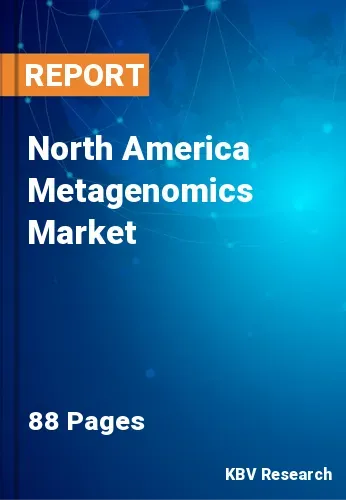The North America Metagenomics Market would witness market growth of 13.0% CAGR during the forecast period (2022-2028).
Shotgun sequencing identifies genes present in environmental materials. In the past, clone libraries were utilized to facilitate sequencing. With the development of high throughput sequencing technology, however, the cloning step is no longer required, and larger sequencing data yields can be produced without this labor-intensive bottleneck. Shotgun metagenomics gives information on both the species in the community and feasible metabolic processes.
Because the collecting of DNA from an environment is essentially uncontrolled, the most abundant microorganisms in an environmental sample are disproportionately represented in the sequence data that results. Prohibitively large sample sizes are required to attain the high coverage required to properly resolve the genomes of underrepresented community members.
On the other hand, the random nature of shotgun sequencing ensures that many of these species, which would otherwise go undiscovered using conventional culturing procedures, will be represented by at least tiny sequence segments. High throughput sequencing does not require DNA cloning before sequencing, therefore eliminating one of the major biases and bottlenecks in environmental sampling. Massive parallel 454 pyrosequencing was utilized for the first high-throughput metagenomic research.
The majority of these funds would be allocated to the three top causes of death: cancer, cardiovascular, and respiratory conditions. In Canada's hybrid public-private healthcare system, the government pays for services while the private sector provides them. In Canada, each province and territory are responsible for its healthcare system. Consequently, each province had a unique system for organizing, administering, and procuring healthcare. In Canada, hospitals and other healthcare institutions have several buying alternatives, including going it alone, utilizing group purchasing organizations (GPOs), and utilizing shared services organizations (SSOs).
The US market dominated the North America Metagenomics Market by Country in 2021, and would continue to be a dominant market till 2028; thereby, achieving a market value of $1,053.3 Million by 2028.The Canada market is poised to grow at a CAGR of 15.6% during (2022 - 2028). Additionally, The Mexico market would witness a CAGR of 14.6% during (2022 - 2028).
Based on Workflow, the market is segmented into Sequencing, Pre-sequencing and Data Analysis. Based on Product, the market is segmented into Kits & Reagents, Sequencing & Data Analytics Services and Software. Based on Technology, the market is segmented into Shotgun Sequencing, 16S Sequencing, Whole Genome Sequencing and Others. Based on Application, the market is segmented into Environmental, Clinical Diagnostics, Drug Discovery, Biotechnology, Food & Nutrition and Others. Based on countries, the market is segmented into U.S., Mexico, Canada, and Rest of North America.
Free Valuable Insights: The Global Metagenomics Market is Estimated to reach $3.2 Billion by 2028, at a CAGR of 13.6%
The market research report covers the analysis of key stake holders of the market. Key companies profiled in the report include Bio-Rad Laboratories, Inc., Illumina, Inc., PerkinElmer, Inc., Thermo Fisher Scientific, Inc., Novogene Co., Ltd., Promega Corporation, Qiagen N.V., Takara Bio, Inc. (Takara Holdings Inc.), Oxford Expression Technologies Ltd., and F. Hoffmann-La Roche Ltd.
By Workflow
By Product
By Technology
By Application
By Country

Our team of dedicated experts can provide you with attractive expansion opportunities for your business.

